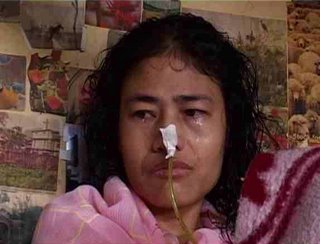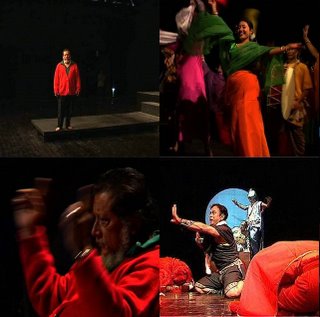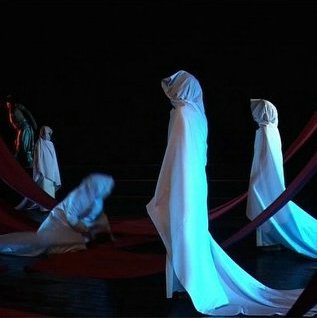The first of the 3 short films was about a dozen women (mothers) who protested naked on the streets of Imphal in front of the Assam Rifles base following the rape and killing of a young woman suspected of being a m ember of one of the insurgent groups in Manipur by the army personnel. The second film showed a mother who laments the extra-judicial killing of her teenage son after he was forcibly picked-up from his home by the army based on suspicion that he was a militant. The third film was about a woman, Irom Sharmila, who has been on a fast-unto-death since November 2000, demanding the removal of the Armed Forces (Special Powers) Act 1958 (AFSPA). For this, she has been locked up in jail by the government under very dubious charges and is being forcibly nose fed.
ember of one of the insurgent groups in Manipur by the army personnel. The second film showed a mother who laments the extra-judicial killing of her teenage son after he was forcibly picked-up from his home by the army based on suspicion that he was a militant. The third film was about a woman, Irom Sharmila, who has been on a fast-unto-death since November 2000, demanding the removal of the Armed Forces (Special Powers) Act 1958 (AFSPA). For this, she has been locked up in jail by the government under very dubious charges and is being forcibly nose fed.
Manipur is a conflict-ravaged State in India’s North-East region. For decades, it has witnessed insurgency and armed separatist movements. The Indian government has attempted to crush these through force, using military power. Arrests, torture, extra-judicial killings - Manipuri people have faced them all. Yet, little is heard about Manipur and its troubles. This is a place that mainland India has marginalised; that the world has forgotten.
Struggles in Manipur, whether by individuals or groups will continue for a long time to come. The films depicted the struggle against the Armed Forces (Special Powers) Act, though there is another problem deeply seated in Manipur, the problem of insurgency. The people are caught in between the army at one end and the insurgents on the other. There are other geo-political events that have the potential to cause massive disruption of the fragile peace existing in Manipur and in neighbouring North Eastern States. While a solution is being sought year after year, the common people continue to suffer.
The second documentary film - 'Some Roots Grow Upwards' explored the work of acclaimed theatre director Ratan Thiyam, who for over 25 years now, has been creatin g a theatre that is as visually compelling as it is intellectually stimulating. His theatre is steeped in the traditional performing arts of his home State, Manipur. But while his aesthetic influences are traditional, his concerns are intensely modern. His plays reflect upon the socio-political crisis gripping the region, the youth unrest, war and violence; at the same time, they also dwell on the larger human condition.The film seeks insights into the art of Thiyam – in portraits of the city where he works, in the quiet beauty of the terrain, in the violent riots that tore the land apart, in the living traditions that come alive at festive time… Formally, it is a juxtaposition of the ‘lived’ and the ‘staged’.
g a theatre that is as visually compelling as it is intellectually stimulating. His theatre is steeped in the traditional performing arts of his home State, Manipur. But while his aesthetic influences are traditional, his concerns are intensely modern. His plays reflect upon the socio-political crisis gripping the region, the youth unrest, war and violence; at the same time, they also dwell on the larger human condition.The film seeks insights into the art of Thiyam – in portraits of the city where he works, in the quiet beauty of the terrain, in the violent riots that tore the land apart, in the living traditions that come alive at festive time… Formally, it is a juxtaposition of the ‘lived’ and the ‘staged’.
A scene from one of Ratan Thiyam's play about the cycle of violence and its consequences in the lives of the people.
Note:I wish to thank Kavita Joshi for the photos used here.
